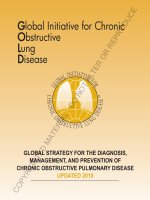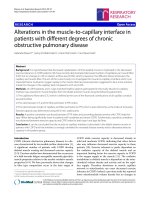Study on clinical and subclinical characteristics of chronic obstructive pulmonary disease patients with lung transplant indication at 103 Military Hospital
Bạn đang xem bản rút gọn của tài liệu. Xem và tải ngay bản đầy đủ của tài liệu tại đây (85.13 KB, 5 trang )
Jourrnal of military pharmaco-medicine n09-2019
STUDY ON CLINICAL AND SUBCLINICAL CHARACTERISTICS OF
CHRONIC OBSTRUCTIVE PULMONARY DISEASE PATIENTS WITH
LUNG TRANSPLANT INDICATION AT 103 MILITARY HOSPITAL
Bui Khac Hiep1; Mai Xuan Khan2
SUMMARY
Objectives: To describe some clinical and subclinical characteristics of chronic obstructive
pulmonary disease patients with lung transplant indication. Subjects and methods: 11 patients
were given pulmonary ventilation, 6-minute walk distance, assessment of dyspnea level,
Doppler echocardiography to measure pulmonary artery pressure, BMI calculation, chest wall
computed tomography scan, posteroanterior chest radiograph, arterial blood gas. Results:
100% of patients with lung transplant indications were men, coughing, sputum, dyspnea,
2
emphysema; BMI was 18.91 ± 3.18 kg/m ; assessment of dyspnea level was 2.82 ± 0.60 points;
6-minute walk distance were 193.45 ± 53.34 m; 87.50% of patients had emphysema on CT
images; 81.8% had dirty lung images and 72.7% had dirty lung images on standard lung
radiograph; FEV1 was 22.64 ± 6.20%SLT; pulmonary artery pressure was 34.30 ± 9.43 mmHg;
PaO2: 85.27 ± 38.40 mmHg; PaCO2: 53.45 ± 8.77 mmHg. Conclusion: Obstructive pulmonary
disease patients with lung transplant indications were 100% coughing, sputum, dyspnea, emphysema;
low BMI, 6-minute walk distance and FEV1; average values of pulmonary artery pressure,
assessment of dyspnea level and PaCO2 were high.
* Keywords: Chronic obstructive pulmonary disease; Clinical and subclinical characteristics;
Lung transplant.
INTRODUCTION
Chronic obstructive pulmonary disease
(COPD) is currently a global disease burden.
At present, COPD is becoming more
prevalence, expected to be the disease
with the 3rd highest mortality rate in 2020
with mortality rate increasing by about
30% in the next 10 years [2]. Worldwide,
lung transplants have been successfully
performed in many countries with positive
results. Lung transplantation is one of the
late-stage treatments for COPD. Choosing
correctly COPD patients with lung transplant
indications plays an important role in the
success and effectiveness of the technique
and prolonging the life time for late-stage
COPD patients. This study was conducted to:
Describe some clinical and subclinical
characteristics of COPD patients with lung
transplant indication.
SUBJECTS AND METHODS
1. Subjects.
- 11 patients diagnosed with COPD
and had lung transplant indications
treated at the Pulmonary Department of
103 Military Hospital from May 2018 to
February 2019.
1. Thai Binh University of Medicine and Pharmacy
2. 103 Military Hospital
Corresponding author: Bui Khac Hiep ()
Date received: 04/10/2019
Date accepted: 20/11/2019
250
Jourrnal of military pharmaco-medicine n09-2019
- Patients selection criteria:
+ Patients diagnosed with COPD outside
of exacerbation according to GOLD (2018)
[3].
+ Lung transplant indications follow the
standards of the International Society for
Heart & Lung Transplantation (2006) [4]:
BODE from 7 - 10 and with one of the
following symptoms:
. Exacerbation with PaCO2 > 50 mmHg.
. Increase in pulmonary artery pressure
or chronic pulmonary heart despite oxygen
breathing.
. FEV1 < 20%SLT or DLCO < 20%SLT or
homogeneous emphysema on chest wall CT.
* Exclusion criteria: Patients with heart
failure, renal failure, severe hepatic
impairment, respiratory infections, under
high-dose corticosteroid
non-cooperative patients.
treatment,
2. Methods.
Prospective, descriptive cross-sectional
study.
- Clinical examination for evaluation:
Coughing, sputum, dyspnea, emphysema
syndrome, consolidation syndrome, bronchial
syndrome, BMI, 6-minute walk distance
(6MWD), assessment of dyspnea level
(mMRC).
- Subclinical: Arterial blood gas, Doppler
echocardiography to measure pulmonary
artery pressure (PAP), and standard
pulmonary heart radiograph, chest wall CT,
pulmonary ventilation.
* Data processing: by SPSS 20.0
software.
RESULTS AND DISCUSSION
Table 1: Common characteristics of study patients (n = 11).
Characteristics
n
%
Male
11
100
Smoking cigarettes or rustic tobacco
11
100
Average age
Average illness duration (
64.18 ± 7.59
± SD) (years)
7.59 ± 6.25
± SD
2
BMI (kg/m )
18.91 ± 3.18
Thin
4
36.4
Normal
7
63.6
The characteristics of age, gender and history of smoking tobacco in our study were
similar to those of other domestic and foreign studies: Dao Ngoc Bang et al (2016)
encountered an average age of COPD patients of 66.07 ± 6.47; the average BMI was
18.61 ± 2.44 kg/m2, and male accounted for 100% [1]. Ghobadi H et al (2015) encountered
an average age of 60.53 ± 13.06 years old with 100% of the patients being male [5].
The BMI characteristics of our study were much lower than that of other studies in the
world, the study by Ghobadi H et al (2015) had BMI of 25.18 ± 3.37 kg/m2 [5].
251
Jourrnal of military pharmaco-medicine n09-2019
Table 2: Respiratory symptoms of patients with lung transplant indications (n = 11).
Characteristics
n
%
Cough
11
100
Sputum
11
100
Dyspnea
11
100
Emphysema syndrome
11
100
Consolidation syndrome
5
45.5
Bronchial syndrome
7
63.6
(
mMRC
(
6MWD
± SD)
2.82 ± 0.60
2-3
10
90.9
4
1
9.1
± SD) (m)
193.45 ± 53.34
≤ 149
3
27.3
150 - 249
7
63.6
250 - 349
1
9.1
Compared to studies around the world, our average mMRC value was much higher.
Sarioglu’s (2009) research studied 88 patients with COPD, gave an average mMRC
value of 1.9 ± 1.1 [6]. Shih-Feng-Liu’s (2012) research studied 89 patients with COPD,
resulted in an average mMRC value of 1.9 ± 1.4 [7].
Patients with lung transplant indications
had a short average 6MWD (193.45 ±
53.34 m). This result showed that latestage COPD severely affects their quality
of life. Compared to studies around the
world, their average 6MWD were much
higher than that of our study. The study
patiens of Michael I (2013) had an
average 6MWD of 369.1 ± 121.7 m [8].
The research of Ghobadi H et al (2015)
studied 60 patients with COPD showed
an average 6MWD of 346 ± 182 m [5].
Shih-Feng-Liu’s (2012) research studied
152
89 patients with COPD, resulted in an
average 6MWD value of 398.4 ± 115.2 m [7].
Sarioglu’s (2009) study gave an average
6MWD value of 375.2 ± 137.0 m [6].
This may be because overseas
patients detected the disease and treated
it earlier, at an early stage and it had not
affect the quality of life of patients, on the
other hand, our study was conducted on
patients with lung transplant indications at
late stage when the disease has greatly
affected the overall condition and quality
of life of patients.
Jourrnal of military pharmaco-medicine n09-2019
Table 3: Distribution of patients with
lung transplant indications by stage and
disease group.
Classification
n
%
11
100
C
1
9.1
D
10
90.9
Stage 4
Disease group
Most patients with lung transplant
indications had moderate and severe
obstruction level with many risk factors
and many symptoms. Our research results
were much higher than those of
Dao Ngoc Bang et al’s (2016) research:
the proportion of patients in the late stage
(GOLD3, GOLD4) was predominant
(84.47%) [1]. This result showed that
patients with lung transplant indications in
advanced stage, with many symptoms,
high risk, need to be applied comprehensively
with treatment measures.
Table 4: Average values of respiratory
parameters (n = 11).
Parameter
± SD
FVC (%SLT)
49.15 ± 12.40
FEV1 (%SLT)
22.64 ± 6.20
FEV1/FVC
37.10 ± 7.54
pH
7.37 ± 0.04
PaO2 (mmHg)
85.27 ± 38.40
PaCO2 (mmHg)
53.45 ± 8.77
PAP (mmHg)
34.30 ± 9.43
In our study, the FEV1 decreased more
than the studies in the world. A study by
Munari Anelise B et al (2018) showed that
the average value of FEV1 was 35.1 ±
15.6%SLT [9]. The study by Sarioglu N et al
(2009) showed that the average value of
FEV1 was 53.3 ± 17.4%SLT [6]. The average
PAP value was 34.30 ± 9.43 mmHg,
higher than normal, late-stage COPD
patients often had pulmonary hypertension.
Arterial blood gas of patients with transplant
indications had much higher PACO2 than
in the study by Dao Ngoc Bang et al
(2016) with the average PaCO2 value of
43.56 ± 7.45 mmHg.
Table 5: Standard chest radiograph
(n = 11) and chest CT (n = 8) characteristics.
Characteristics
Standard
chest
radiograph
Chest CT
images
n
%
Dirty lung images
8
72.7
Emphysema
9
81.8
Emphysema
7
87.5
Bronchiecfasis
3
37.5
Pulmonary
fibrosis images
2
25.0
Interstitial
thickness images
1
12.5
Characteristics of thoracic CT images
were consistent with the diagnosis of
patients preparing for lung transplant. The
main images encountered were emphysema
images. Other images are less common.
This showed the limitation in patients
screening, with the disease aspects
requiring lung transplant not diverse.
Our research results were higher than those
of Dao Ngoc Bang (2016) with 80.3% of
patients encountering emphysema images
on thoracic CT films.
CONCLUSION
For COPD patients with lung transplant
indications at 103 Military Hospital, we draw
some conclusions:
253
Jourrnal of military pharmaco-medicine n09-2019
- 100% of patients were coughing,
sputum, dyspnea and emphysema.
- The average time of illness was 9.73 ±
6.25 years; BMI: 18.91 ± 3.18 kg/m2;
mMRC: 2.82 ± 0.60 points; 6MWD:
193.45 ± 53.34 m.
- FEV1: 22.64 ± 6.20%SLT; PaO2:
85.27 ± 38.40 mmHg; PaCO2: 53.45 ±
8.77 mmHg; PAP: 34.30 ± 9.43 mmHg.
- Standard pulmonary radiograph: Dirty
lung images were seen in 72.7%; emphysema
images 81.8%.
- Thoracic CT showed 87,5% of
emphysema images.
REFERENCES
1. Dao Ngoc Bang, Dong Khac Hung,
Ta Ba Thang. Changes of some parameters
of respiratory funtion measured by whose
body plethysmography in patients with stable
chronic obstructive pulmonary disease.
Journal of Military Pharmaco-Medicine. 2016,
pp.114-121.
2. Mathers C.D, Loncar D. Projections of
global mortality and burden of disease from
2002 to 2030. Plos Med. 2006, 3 (11), p.442.
3. Global Intiative for Chronic Obstructive
Lung Disease. Global strategy for diagnosis,
management and prevention of chronic obstructive
pulmonary disease. Update 2018. 2018.
254
4. Orens J.B, Estenne M, Arcasoy S et al.
International guidelines for the selection of
lung transplant candidates: 2006 update - a
consensus report from the pulmonary
scientific council of the international society
for heart and lung transplantation. The Journal
of Heart and Lung Transplantation. 2006, 25 (7),
pp.745-755.
5. Ghobadi H, Fouladi N, Beukaghazadeh
K et al. Association of hight sensitive CRP
level and COPD assessment test scores with
clinically important predictive outcomes in
stable COPD patients. Tanaffos. 2015, 14 (1),
pp.34-41.
6. N Sarioglu, A.O Alpaydin, A.S Coskun,
P Celik et al. Relationship between BODE
index, quality of life and inflammatory cytokines
in COPD patients. Respiratory Medicine. 2010,
5 (2), pp.84-91.
7. Shih-Feng-Liu, Ching-Wan Tseng, MeiLien-Tu et al. The clinical COPD questionnaire
correlated with BODE index: A cross-sectional
study. The Scientific World Journal. 2012.
8. Michael I, Pokey, Spruit et al. Six minute
walk test in chronic obstructive pulmonary
disease. American Thoracic Society. 2013,
pp.382-386.
9. Munari Anelise B, Gulart Aline A, dos
Santos Karoliny et al. Modified medical
research council dyspnea scale in GOLD
classification better reflects physical activities of
daily living. Respiratory Care. 2018, pp.77-85.









